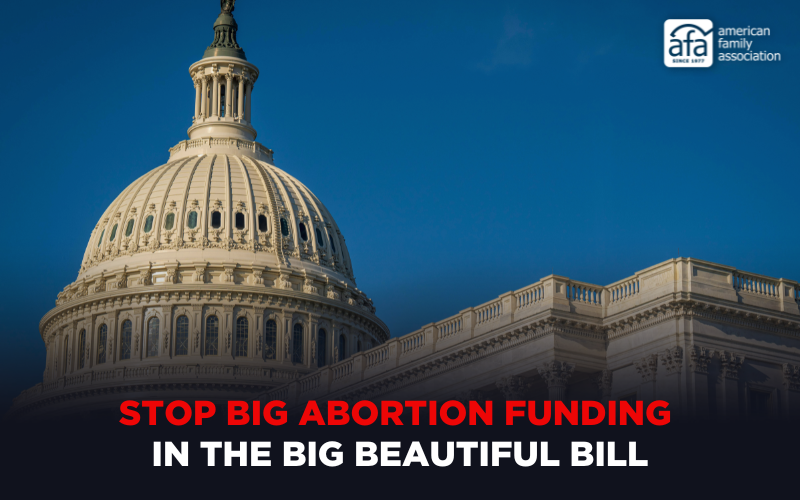Federal Bill Could Protect Children from Porn
Sign up for a six month free
trial of The Stand Magazine!
Pornography is a $12 billion industry in the U.S. The great irony is that the distribution of hardcore pornography is actually illegal. You wouldn’t know it, but it’s true!
Many claim that pornography is protected by the First Amendment of the Constitution, which states that “Congress shall make no law…abridging the freedom of speech.” This is one of those big lies that’s been told so many times, people have assumed it’s true.
It is not.
The laws are simply not being enforced.
According to Patrick Trueman, president of the National Center on Sexual Exploitation (NCOSE), the Supreme Court has interpreted the language of the First Amendment countless times over the last 200 years and has never once found that it protects a right to distribute obscene materials – hardcore pornography.
It is illegal to distribute obscenity (hardcore pornography) by person, mail, or internet. The first offense can land a person in prison for up to 5 years. Yet, it’s everywhere!
Pornography is readily accessible in the U.S. for children. According to Fight the New Drug, a research-based nonprofit organization that raises awareness on the harmful effects of pornography, the average age a child sees porn for the first time is estimated to fall somewhere between 8 and 11. And the long-term detrimental effects on the child’s brain and heart are severe, leading to widespread societal dysfunction.
This is why Ricky Darr, co-founder and executive director of the Nashville-based National Decency Coalition (NDC), is determined to bring awareness to the need and practicality of implementing a nationwide system requiring internet users to verify the user’s age before granting access to pornography.
The United Kingdom (UK) beat us to it. Kind of.
The UK age-verification law was passed in 2017, but it has yet to be implemented due to a statutory compliance issue with the European Union.
Darr believes the U.S. can learn from the UK’s mistakes…and from our own.
In the U.S., a similar law, the Children’s Online Protection Act of 1998, also failed to take effect. The Supreme Court established in 2004 that its broad definition of “harmful materials” could potentially fall outside the definition of “obscenity” and, therefore, infringe on free speech.
A lot has changed since 1998. While technological advancement has exponentially expanded access to internet porn, it has also changed the landscape for creating age-based restrictions – making it entirely possible. Darr believes the U.S. Federal Trade Commission (FTC) could easily set technology adaptable standards for age verification.
And though internet providers argue that the burden of responsibility for protecting children is too great, the needed technology too advanced, and the cost exorbitant, Russ White of Citizens for Community Values in Memphis, Tennessee, who works alongside Darr, has argued, “The cost to develop this technology is one cent per month per customer.”
The Obama administration dissolved the Obscenity Prosecution Task Force which was committed to holding pornography distributors accountable.
That was then. This is now. We are in a new era. It is time to say, “Not on our watch!”
That’s why President Trump has committed to aggressively tackle the growing illegal porn epidemic that is destroying the moral fabric of our society. His position is delineated in The Children’s Internet Safety Presidential Pledge, which he signed in July 2016.
A total of 13 child advocacy and anti-sex trafficking groups and leaders have pledged support for the initiative to bring a federal bill before Congress. And in early December 2019, four Republican representatives sent a letter to Attorney General Bill Barr reminding him of Trump’s promise and calling on the Department of Justice to enforce obscenity laws, especially pornography involving children.
“As research has proven,” explained Darr, “pornography is especially dangerous to minors; therefore, the future generations and the future of our nation is at risk. We have the opportunity to confront this issue, and we need to act.”
Federal age verification legislation is a common-sense first step for enforcing the law. Pornography is obscene, destructive, and illegal. Let’s start by protecting the vulnerable for whom we are responsible – our children.
NDC frequents the nation’s capital on this issue and has gained the support of a number of legislators. If you sign NDC’s petition (here), your voice will be heard. You will play a vital role in influencing decision-makers and bringing about this necessary change in our nation – simply by joining forces with others who care about our children and their future.

Sign up for a free six-month trial of
The Stand Magazine!
Sign up for free to receive notable blogs delivered to your email weekly.


















